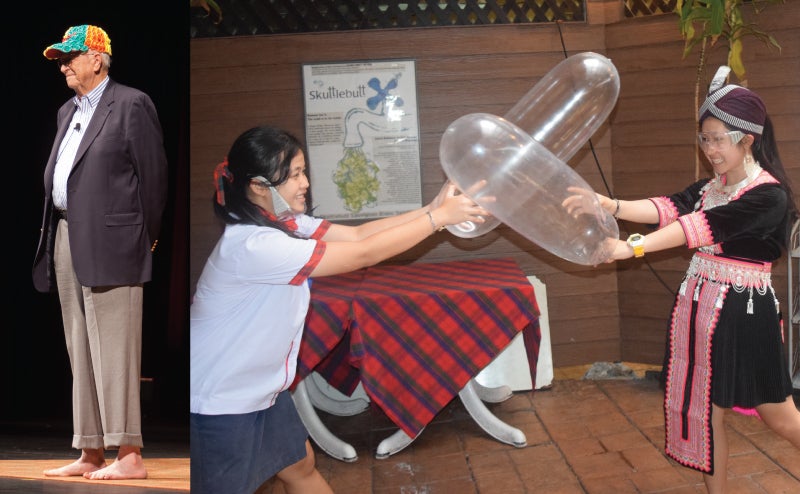Mass protection
All Hail the Condom King
With creativity and fun, Mechai Viravaidya has helped save millions of lives by promoting easier access to contraception.

I’ve never met anyone who knows how to have as much fun with condoms (in public, anyway) as Mechai Viravaidya.
The social activist from Thailand has fashioned the contraceptives into colorful hats, dresses, shirts, suits and other sartorial creations. (Mechai once gave my dad a baseball hat made from hundreds of condoms. He wore the cap at our foundation’s annual meeting, earning big laughs from the staff.) He’s started school contests to see who could inflate a condom into the biggest balloon, persuaded Buddhist monks to bless them with holy water, and convinced police to hand them out on the street (a program he dubbed “cops and rubbers”).

All this fun had a serious goal—to destigmatize contraceptives in a culture where talking about safe sex and family planning was taboo. Mechai’s efforts have been so successful that he is affectionately known as “Mr. Condom,” or “The Condom King,” in Thailand.
Mechai never sought this condom crown. Born in Thailand to a Scottish mother and Thai father—both of whom were doctors—Mechai trained as an economist and started his career at Thailand’s economic planning agency. It was there that Mechai discovered that his country was experiencing alarming population growth. At the time, the average Thai family had seven children and the annual population growth rate was over 3 percent. Most women didn’t have—or even know about—basic birth control.
Worried about Thailand’s future, Mechai decided to launch an organization called the Population and Community Development Association (PDA) in 1974 to promote family planning. From the start, he took an unorthodox approach to promoting safe sex. At the time, Thailand had few doctors, so PDA trained nurses and midwives to educate couples about family planning strategies. In a country where most people were uneasy discussing sex, Mechai pushed the conversation out into the open. He made contraceptives readily available from the smallest roadside stand to the biggest stores and taught people that there was no reason to be shy about talking about sexual health. He won over his audiences with humor, using condoms as batons in school relay races and hosting vasectomy festivals where men were rewarded with a free hot dog for undergoing the procedure. Thanks to these and other efforts, Thailand’s annual population growth fell from 3.2 percent to less than 1 percent today.
Mechai’s work with PDA helped prepare Thailand for its biggest health challenge of the 1980s and 1990s: HIV/AIDS. When the AIDS epidemic came to Thailand, Mechai and PDA responded with prevention programs targeting those at greatest risk, including sex workers and their clients. PDA launched roving HIV testing vans and established AIDS education theme nights in the country’s red-light districts.
Later appointed head of Thailand’s national HIV program, Mechai continued to challenge taboos in Thai culture by persuading taxi drivers to hand out condoms to their passengers and launch attention-grabbing safe sex campaigns, including condom ads painted on to the side of elephants. Believing that everyone needed to be involved in the health challenge facing Thailand, he partnered with the military to run public service announcements about HIV on the radio. Thailand became one of the first countries in the world to achieve a decline in HIV infections. New cases of HIV decreased by 90 percent from 1991 to 2003.
The world can continue to learn from Mechai’s efforts to expand access to contraceptives. Far too many people become infected with HIV each year. Too often, the people facing the greatest risk—including young women, sex workers, men who have sex with men and people who use drugs—do not have access to the contraceptives they need to protect themselves.
Better access to contraceptives is also critical for family planning. When couples have access to contraceptives—including ones that women control, unlike condoms—they are more likely to have smaller families, women are freer to work outside the home, and fewer women die from unsafe abortions or pregnancy-related complications. Communities benefit too because parents can devote more resources to their children’s health and education—setting them up for more productive futures.
Mechai’s contributions to Thailand have gone well beyond his success promoting family planning and HIV prevention. He was elected three times to serve in Thailand’s senate. To raise money for PDA, he launched a chain of restaurants named Condoms and Cabbages (because condoms should be as plentiful as cabbages in Thailand, he says). The restaurant’s motto is “our food won’t make you pregnant.” He also started a school and fought rural poverty through a village development program to support community entrepreneurship and empowerment.
Mechai’s extraordinary life and work in global health and development has helped improve the lives of millions of people in Thailand. And the Thai people have thanked him with an honor that is perhaps the greatest measure of his impact. When people in Thailand want a condom, they don’t call it a condom. Instead, they refer to it by the name of the man who taught them the importance of using one—they ask for a “Mechai.”


